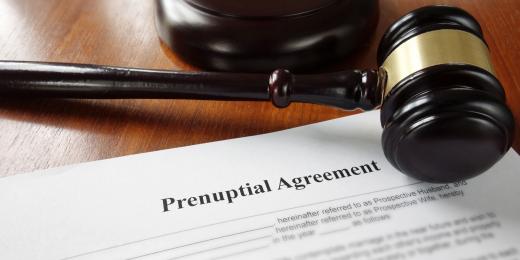Should I sign a prenup agreement?

There was a time when prenup agreements were the preserve of the ultra-wealthy and if a fiancée raised the topic of signing a prenuptial agreement, it caused offence, with thoughts that there was a lack of trust or faith in the long-term future of the relationship.
Nowadays, prenuptial agreements are not just for celebrities or the fabulously rich. The increase in popularity of prenuptial agreements has seen a significant rise in the number of enquiries that the best London family law solicitors receive about whether couples should sign a prenuptial agreement.
Central London based OTS Solicitors say that people assume that calls enquiring about prenuptial agreements are always made by the fiancée who wants to protect their assets. However, it is the experience of the family team at OTS Solicitors that enquiries about prenuptial agreements are made by a whole range of people. For example, telephone calls come from parents, financial advisors, accountants, agents, trust administrators, and of course, the engaged couple.
Many assume that the top London family law solicitors will say that if you are the fiancée with the money, the income or potential inheritance, then you should sign a prenuptial agreement and that if you are the fiancée who is sometimes referred to as the economically weaker fiancée, that you should refuse to sign a prenup agreement. However, it is not as simple or as straightforward as that.
The family law team at OTS Solicitors are experienced in advising on the pros and cons of signing a prenuptial agreement. Most engaged couples do not realise that if you are asked to sign a prenuptial agreement that should be the starting point for a discussion about what should go into the agreement, rather than one fiancé being presented with a completed document to sign. Sorting out what goes into a prenuptial agreement is a matter for discussion and, of course, expert legal advice.
OTS Solicitors say that there are many reasons why top London family law solicitors have seen a rise in the popularity of prenuptial agreements such as:
- International couples are on the increase with a rise in the numbers of people in the UK deciding to marry partners from countries where it is the normal practice for engaged couples to enter into a prenuptial agreement. In many jurisdictions it is the accepted norm to elect a “property regime” to govern how family finances are divided in the event of a divorce;
- Wedding celebrations taking place after a long period of partner’s living together in cohabiting relationships during which time the couple have kept their finances and property separate. This means that the signing of a prenuptial agreement maintains the status quo of separate financial arrangements;
- Marriages taking place without couples having spent time living together first, sometimes as a result of the marriage taking place earlier than might otherwise have been the case to enable a fiancé to gain entry to the UK under Immigration Rules;
- The increase in foreign based assets such as second homes or holiday homes;
- The rise in the number of couples receiving financial help from family members to fund the deposit on their first family home;
- The increase in the knowledge of family members about the benefits of prenuptial agreements and the potential options available to ring fence the family money from divorce claims;
- The number of engaged couples getting married at a later age in life and therefore needing more sophisticated family law advice because of the extent of their pre-marriage owned assets and their desire to protect some of their property and assets for children from previous marriages or relationships;
- A prenuptial agreement is signed abroad by a couple but as the UK family court could potentially have jurisdiction to resolve any divorce and financial claims the couple are advised to sign what is known as a “mirror” prenuptial agreement in the UK.
What questions should you ask before a prenuptial agreement is signed?
- The couple’s current country of residence and their countries of domicile;
- The couple’s ages and relationship history – has either of them been married before? Do they have any previous children? Do they have any financial commitments to children from previous relationships or are they making any spousal maintenance payments to former spouses;
- What assets do the couple own individually and jointly;
- Where assets are located – is the wealth based overseas;
- Do the couple plan to relocate to another country, for example their plan may be to move to another country for Employment purposes or to move abroad on retirement;
- What is the couple’s income? Are their levels of income similar or might their earnings change, for example because of one partner giving up Employment to look after children;
- Has either of the couple received money from family or because of a previous divorce settlement;
- Is either of the couple a beneficiary of a trust or a shareholder in a business? If so what is the nature of the trust? If a fiancé is a business owner and shareholder is there a shareholder agreement.
Why are these prenuptial agreement questions necessary?
- Relevant financial and personal disclosure;
- No undue pressure to sign the prenuptial agreement;
- Sufficient time before the marriage to consider and reflect on the contents of the prenuptial agreement;
- Legal advice so you both understand the contents of the prenuptial agreement and understand the consequences of signing the prenuptial agreement;



